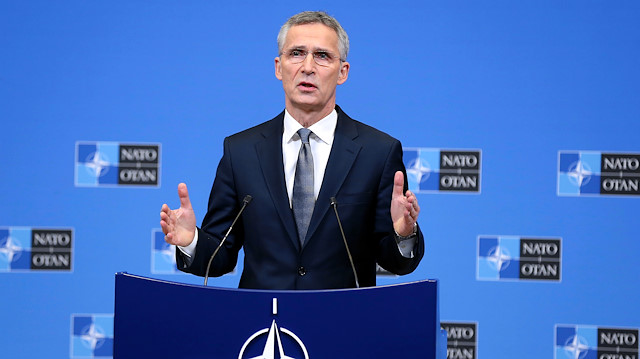
NATO chief Jens Stoltenberg says foreign ministers to address Russia’s behavior, extremism in Middle East, North Africa
NATO foreign ministers will discuss security challenges this week, the head of the organization said on Monday.
"NATO Foreign Ministers are meeting this week to address a wide range of security challenges, including Russia’s destabilising behaviour, violent extremism in the Middle East and North Africa and continuing instability in Afghanistan," NATO Secretary General Jens Stoltenberg said in a statement.
Stoltenberg's remarks came ahead of a two-day meeting due to start on Tuesday in Brussels.
He said the allies will meet on Tuesday with NATO's partners, Georgia and Ukraine, adding: "They both face serious security challenges from Russia, and we will continue to give both countries practical and political support."
Stoltenberg said the ministers will also exchange views on the Intermediate-Range Nuclear Forces (INF) Treaty that was signed in 1987 between the U.S. and the then Soviet Union.
"This Treaty eliminated an entire category of weapons, but it has been put in jeopardy by Russia," he added.
On Oct. 21, U.S. President Donald Trump announced his intention to withdraw from the treaty.
According to the statement, Stoltenberg said Russia has developed, produced and deployed a new missile, which “could reach European cities with little or no warning."
The secretary added Washington is in full compliance with the INF Treaty, saying: "There are no new US missiles in Europe, but there are new Russian missiles."
Stoltenberg said the ministers will also discuss the challenges coming from the Middle East and North Africa.
"We will discuss Iraq, where we are helping train local forces, and our experts are helping set up defense education facilities," he said.
He added the ministers on Wednesday will hold a meeting on the Western Balkans, joined by EU High Representative Federica Mogherini.
"They will discuss Skopje’s progress towards NATO membership and the next steps in developing the Alliance’s relationship with Bosnia and Herzegovina," according to the statement.
The NATO chief also said the ministers will endorse the organization’s readiness to accept Bosnia’s first annual national program. "This is an important tool, which can help the country implement political, economic and defense reforms," he added.
He said a meeting of all nations contributing to the Resolute Support training mission in Afghanistan will conclude Wednesday's session.
"We must continue to ensure that the country never again becomes a safe haven for international terrorists," Stoltenberg said.
Turkish Foreign Minister Mevlut Cavusoglu will attend the meeting. He is expected to have bilateral meetings with his counterparts.




